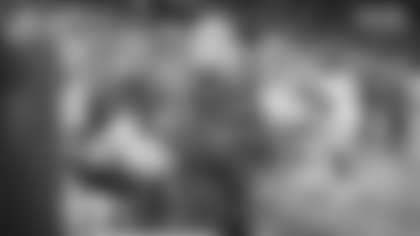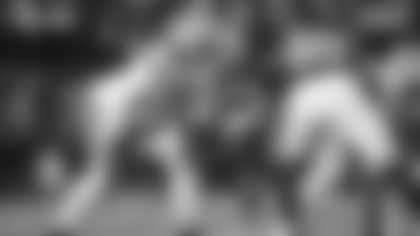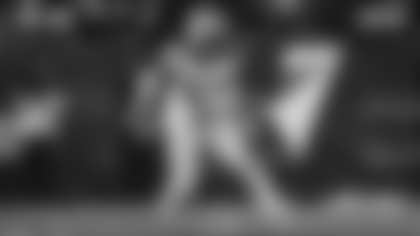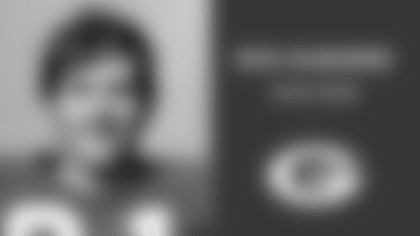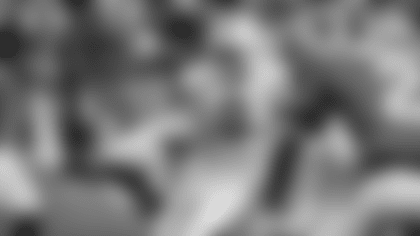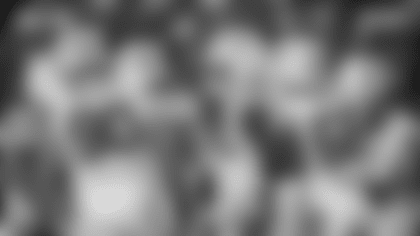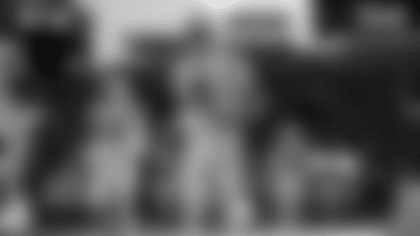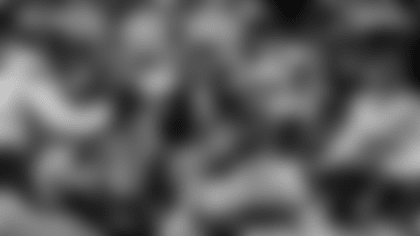*Cliff Christl started gathering oral histories with former Packers and others associated with the team in 2000 and will continue to gather them as Packers historian. Excerpts from those interviews will be periodically posted at **www.packers.com*
A native of Green Bay, Robert J. Parins began following the Packers as a young boy in the 1920s. Before becoming team president in 1982, he attended Green Bay East High School, practiced law in Green Bay, served as Brown County district attorney from 1949 to 1950 and was a Brown County circuit court judge from 1968 to 1982. Parins was elected to the Packers' board of directors in 1966 and to the executive committee in 1979. This is the first of a two-part oral history and covers Parins' life and career before he became Packers president. The second part will run next month.
On his early memories of the Packers: "My father had tickets to the Packers' games back in the late '20s. I used to go with him. In those days, you could get in with your parents for nothing, just walk with them, which I did. Whenever he wasn't going to the game or using his tickets, then in those days, it was commonplace for the kids – I was like under 12 – to go to the back door of East High School, where the gym was, and you could always get in with a player if you could get to carry his helmet. I used to carry the headgear for Jug Earp. Most of us would sit in the hay along the sidelines. It was always cold and I suppose they had that to keep the field from freezing. Then I suppose many times I jumped over the fence, which was another way kids got in and I did too. So I was going to football games with the Packers certainly '29, '30 and '31 and continued to go regularly until I went away to school in 1936."
On the crowd atmosphere in those years: "I think they were very responsive, a pretty noisy crowd. I don't recall any (drinking). But now that I think about it there were times you'd go under the bleachers and see bottles and stuff like that."
On having a law office in the Northern Building starting in 1944: "Curly Lambeau was right down the hall from us. Second floor. I just think it was his own personal office. I don't even know if he had a secretary. My associate at the time was Meyer Cohen and they used to visit a lot. I have a suspicion that at times Mike may have assisted him with some contracts. And (Lambeau) would be around a lot in the barbershop. Joe Gryboski had his barber shop on the second floor of the Northern Building and it was commonplace for the tenants to gather there in the morning hours at some time and just shoot the bull."
On his impressions of Lambeau: "Kind of an outgoing guy. He was an important guy. So when you walked into the barbershop or any other office and you saw him there, he caught your immediate attention. It was like many years later when Vince Lombardi was here. The magnetism. Curly had some of that, too. And a good-looking guy, always immaculately dressed."
On whether Lambeau used the office for his insurance business or for Packers business or both: "I don't ever remember seeing a ballplayer up there. I got to know Tony Canadeo pretty well and I guess they'd go up there once in awhile over contracts, but I never saw a player up there."
On prosecuting as Brown County's district attorney in 1950 former Packers star Bernard "Boob" Darling on two counts of negligent homicide in a hit-and-run accident on East Mission Road in the Town of Allouez that killed 15-year old Shirley Mae Trout on Halloween night a year earlier:"In my opinion, it was a clear hit-and-run case. Whether we could prove negligent homicide because of the strong imposition of alcohol in the case, I think that's where it failed. We just didn't have the evidence to support a conviction."
On the jury's decision to acquit: "We were devastated with that."
On his first official association with the Packers: "I bought a share of stock in 1950 because my neighbor was soliciting people to buy shares. So I bought a share of stock. It's the only one I still have."
On joining the Packers' board in 1966: "I was close to it because Dominic (Olejniczak) was president in those years and was a good friend. He had his office with us. When I had an office on South Madison Street, after I left the Northern Building, Coke Cherney was with me. Then he left, I think in 1955, and Dominic came into my office at that time. He (also) had his cottage next to mine. In the early years, it was commonplace for him to entertain the coaches out there. And I played golf with Tony Canadeo, Jake Stathas and Dick Bourguignon, all of whom were on the board."
On how active he was as a board member: "I had so little to do with the Packer office, even as a director, that I used to tell people it was like working for the Red Cross. To say that I had inner-knowledge of the Packers, no, it was nothing. Even after Dan Devine was hired, not at all, even though I was close to Dominic, close to Tony."
On whether there was a lot of politics involved back then when it came to being elected to the board or executive committee: "I can't say that for sure. I don't know how to say this, but there was always a suggestion implicit in my mind at least that there was somewhat of a cleavage on the board. Like Max Murphy always wanted to be president. He had his little clique always trying to get Max as president of the Packers. There was that big division even when Dominic was elected in 1958. I know after I got to be president, Max came to see me and he was kind of an outspoken guy and he said, 'You little (S.O.B.), I always wanted to be president.'"
On whether he was aware that Murphy had nominated Dr. Robert Cowles to challenge Olejniczak for the presidency in 1958, but that Cowles lost the vote, 27-12:
"I don't remember that. I had heard Max Murphy wanted the position. I knew (Cowles) because he used to come to the Elks Club for lunch, but I didn't know him very well. I just knew who he was. Pretty nice guy."
On becoming a member of the executive committee in 1979: "All I know is that was the farthest thing from my mind when Dominic called me and asked if I would be interested in becoming vice president to succeed Bourguignon. There was this cleavage still existing. Even during the time when I was a director, there were never any outward movements to create a division in the executive committee or with the president, but I knew it existed."
On how he learned he was going to become a member of the executive committee: "I was still on the bench in 1979 when I got a call from Fred Trowbridge or it might have been Dominic. They wanted me to come for a meeting at Fred's office (in the Bellin Building). I got there and Dan Beisel (publisher of the Green Bay Press-Gazette) was there. When I walked in, there were three other guys. I had no idea what the hell they were going to talk about. That was the farthest thing from my mind. They told me that they'd like me to succeed Dick Bourguignon as vice president. I said immediately, 'What about Tony?' That ended that. They asked me to be a candidate. As I sit here today, I can't even give you any decent reason why they picked me to be the candidate to succeed Dick as vice president."
On the contested election that followed: "Then you have to be elected by the board and Tony was nominated, too, at that time. It was contested, and Tony and I were such great friends. I think Jim Nellen (nominated Canadeo). I'm not sure about that, but I think that's what it was. I wasn't overly concerned because if it didn't work for me, I was happy with Tony."
On Fred Trowbridge's power as the team's attorney and member of the executive committee from 1950 to 1981, including 22 years as treasurer: "Very powerful. I think, for all intents and purposes, he was the driving force behind the scene. He was a strong man. He certainly had his ability to put his finger on a problem. I learned afterward, after I got to be president, that he was strongly appreciated by other owners at league meetings. Fred was one of the real spokesmen. I heard that many, many times from guys like Art Rooney and George Halas and Wellington Mara. Fred used to say, 'I'm just a country lawyer, but….'"
(Note: Rooney, owner of the Pittsburgh Steelers and a member of the Pro Football Hall of Fame, offered Trowbridge's name as a candidate for commissioner of the NFL in 1960, but Trowbridge said he wasn't interested.)
On any other executive committee members who wielded considerable influence during Parins' time as a director: "I don't know of anybody who had a strong voice. Tony (Canadeo) might have had the strongest. He was willing to speak up and everybody kind of respected him, not only on the executive committee, but the whole board. And Tony was always assertive."
On Olejniczak's influence as president from 1958 to 1982: "I don't have the answer except that he was obviously instrumental in seeing that the right people were on the board so there was some continuity there. He was a good guy at that. Likeable, got along with everybody. I never heard anybody say anything derogatory."
On Olejniczak being the longest serving president in Packers history:"He was good in the sense he was a good politician. He was able to control the board and that made him successful. To answer your question, I think yes, he was a good president. And he certainly had a lot of respect in the league."
On the transition of power from Olejniczak to him before he was even elected president: "I think (Olejniczak) became ill in like 1980. I remember he called from St. Mary's Hospital one day and said he couldn't go to the Super Bowl and had these tickets. He said, 'Somebody should go and represent the Packers. Would you and (wife) Beth go?' I said, 'Why sure.' I had never been to a Super Bowl outside of the first two."
On how he learned he was going to replace Olejniczak and become president: "I'll say it this way. This would have been about 1981. There was a lot of grumbling, particularly about Bart (Starr as coach). I had tried to hire Jim Finks when I was vice president. Dominic was quite ill and I'd go out there every noon hour and handle the mail and all that stuff at the Packer office while I was sitting as a judge. Finally, there was a lot of discord on the board. Anyway, I then suggested to Fred (Trowbridge) and to Dominic that we try to hire the best football man we can find and get him in here to run the team. So I tried to hire Jim Finks. That was before he went with the (Chicago) Cubs. He was with the Bears. So I went to (George) Halas. First, I called Ed McCaskey, who was his son-in-law. I was going to league meetings about the end of '81 and I had gotten to know Ed McCaskey a little bit. So I got Ed on the phone and asked him for permission to talk to Finks. He said, 'You've got to talk to George.' I called George and he wasn't in, so I left a message. I was on the bench trying a case and the bailiff came in and said, 'George Halas is on the phone.' I went out and picked up the phone in my office and said, 'George, what the hell you working so late for?' It was like 4:30 in the afternoon. I'll never forget this, he said, 'Well, judge, somebody has to pay the rent.' So I asked permission to talk to Jim Finks and he refused me, which I was really surprised about. I had talked to Art Rooney and Tex Schramm and Wellington Mara – those were the guys I went to for advice – and they all said, 'Get Jim Finks.' They said that he and George weren't getting along. But he refused to give me permission and that ended that."
(Note: Finks was elected to the Pro Football Hall of Fame as an administrator in 1995. Over more than 25 years as an NFL general manager, Finks turned losing teams in Minnesota, Chicago and New Orleans into winners.)
On how that led to him becoming president: "Then I recommended to the board that they hire a full-time president. I had no idea at the time it was going to be me. I didn't say from the outside. At that time, everybody came from the board and if you weren't on the board, you weren't eligible. So I got that approval. Then John Stiles came to me downtown, at the courthouse, and said, 'The people I'm talking to on the board think that you should be the new full-time president.' That's how it happened, just like that. It wasn't Dominic. He was ill at the time."
On whether Olejniczak was ready to relinquish the duties: "I think so. He didn't resist it."
On why he felt the Packers needed a full-time president: "It just seemed to me there was a need for somebody to be on top of things all the time because of budgeting problems. It just seemed to me the time had come to have a full-time president. I presented it to the board and they agreed."
On how much time Olejniczak had spent at the Packers offices during his later years as president: "As I mentioned, he had an office with us downtown. Without knowing for sure, I thought he spent about half a day out there all the time."
On Parins' initial salary as full-time president: "It wasn't $100,000. They always paid (Olejniczak) a little something, but not much."
On how contentious the 2 hour, 45 minute board meeting was when Bart Starr was stripped of his general manager title on Dec. 27, 1980: "It was pretty contentious. Buckets (Goldenberg) was still living and he was riding hard."
On whether there were board members who wanted Starr fired as coach at that point, as well: "No question about it and I think I saved him that day. Remember the guy from Public Service? (L.G. Roemer). Boy, he was bitter. 'Get rid of that guy or he's going to come back and bite you. You can't trust him.' There might have been a few others. It was a tough meeting. Bart was lucky to survive the meeting."
So the idea to strip him of his GM title was a compromise? "That's the way it wound up. I can't remember how that developed anymore. I remember somebody asking Trowbridge if the board had the right to fire him. Trowbridge said, 'You're the board. You can do what you want.' And they did. They wanted to fire him. That's when I made my recommendation, I think, to hire a full-time football man as general manager, but that didn't develop. And it was after that, I think, that I recommended hiring a full-time president, but I can't remember for sure."
At some point that day did you speak up and say let's find a compromise to keep Starr as coach?"Yes. I was running the meetings."
On whether Starr had any strong backers at that meeting: "None. I'm ashamed to say that, but it's true. Somehow or other, we arrived at a compromise. I was trying to save his job. I didn't want him to be fired in the middle of the stream."
(Note: Starr had been coach for six years at that point and had won more than five games only once. His record was 31-57-2.)
On whether Goldenberg was often outspoken in board meetings: "Oh yes. He wasn't afraid to speak up. He complained readily about Bart and he complained readily about Dominic."
(Note: Goldenberg played for the Packers from 1933-45 and was a member of the board from 1953-85. As a player, he was named to the NFL's All-Decade Team in the 1930s.)
On whether that contentious 1980 board meeting was typical or an anomaly: "No, it was not at all typical. The board generally went along with whatever the president wanted or what Trowbridge would recommend. Generally, Trowbridge and Dominic would handle the meeting. Toward the end, I was handling the meeting with Trowbridge."
On how he and the executive committee arrived at the decision to split administrative duties between Tom Miller and Bob Harlan without taking away Starr's authority over football decisions: "That was my idea. When I restructured, I restructured the entire front office and I gave these guys additional titles. I think assistant to the president. It seemed to me that at that time I didn't want to strip Bart of his ability to draft people – I should have – and to run the football side of the company. Tom was doing the office stuff and doing a good job. He was in charge of different departments. And Bob was in charge of front-office personnel and things like that. And I thought both were doing an adequate job. I was not president then. But I felt the need for a general manager under our rules no longer existed immediately because I lost Finks. I hate to tell you this. I tried to get so many different guys. Tex Schramm. Gil Brandt. Gil Brandt said his wife wouldn't come. She was a multi-millionaire in her own right and he wouldn't come up here. I'm not so sure that would have been a wise move anyway. But I tried to get a number of different people to come up here as general manager. There was another guy in Dallas, (vice president of administration Joe) Bailey. He came to Green Bay, but I wasn't satisfied he was any better than Bob Harlan. Most of these people didn't have a football background. They had good managerial skills. There was a guy from Detroit. Jerry Vainisi. He wanted it bad. So I set up a line of responsibility and the whole board approved it, and Bob and Tom had a split of duties. They were getting along fine and it worked out perfectly well."
Parins died May 26, 2017, at age 98. The excerpts above were taken from interviews conducted in 2006, 2008, 2009 and 2012.
- *




